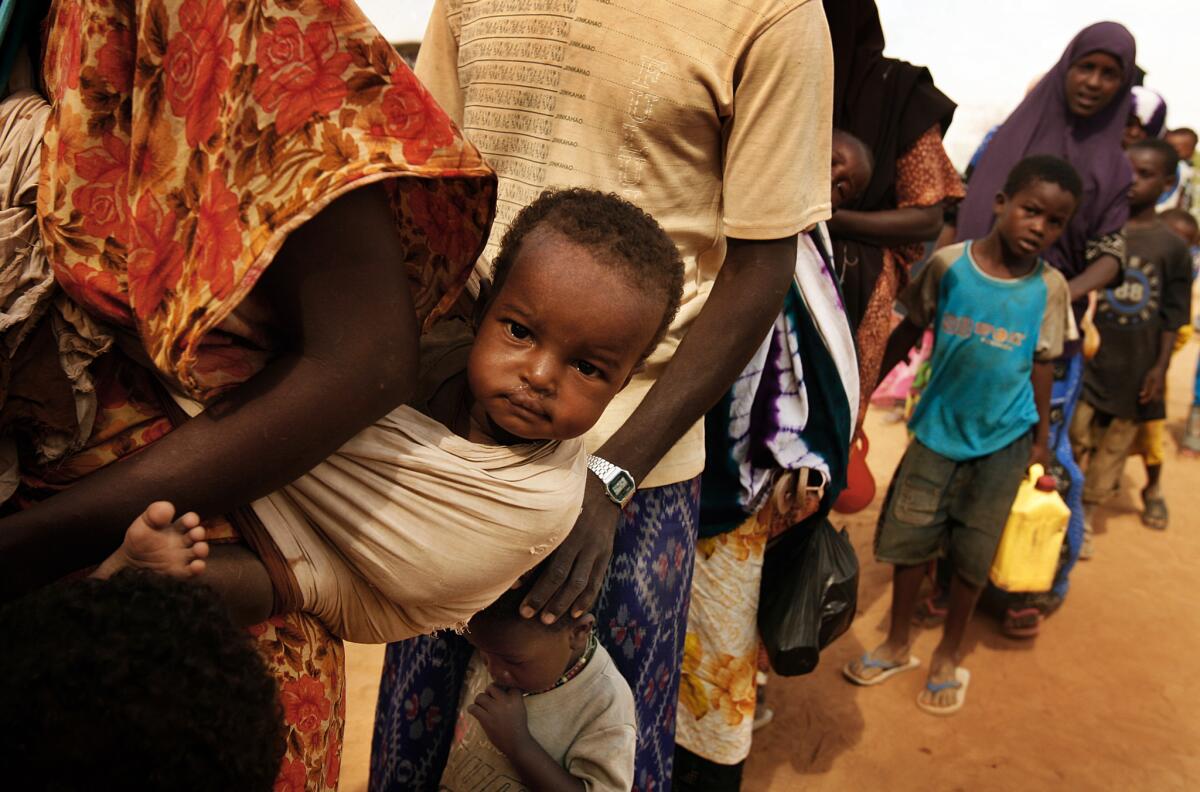Kenya to shut down refugee camps serving more than 500,000 people

Refugees wait to be admitted into the Dadaab refugee camp in Kenya in 2009. On Friday, the Kenyan government said it would close down Dadaab and another camp.
The Kenyan government said Friday it would close two refugee camps, including one of the world’s biggest, due to a lack of security and economic challenges as human rights groups condemned the plan.
The closure of the camps will have adverse effects and the international community should collectively take responsibility for the humanitarian needs that arise, said Karanja Kibicho, permanent secretary at the Interior Ministry.
The government has disbanded the Department of Refugee Affairs, which works with humanitarian organizations looking after the welfare of refugees, Kibicho said.
The voluntary repatriation process -- contained in an agreement signed in 2013 by the United Nations High Commission for Refugees and the Kenyan and the Somali governments -- has been very slow, Kibicho said.
He said Kenya has been hosting the refugees for nearly 25 years and it had taken its toll on the country.
The camps targeted for closure are Dadaab and Kakuma. Dadaab in eastern Kenya is the largest, with more than 328,000 refugees, mainly Somalis escaping conflict in their war-torn country that is struggling to defeat an insurgency by Al Qaeda-linked Shabab insurgents.
The Kakuma camp hosts 190,000 refugees, most of them South Sudanese escaping civil war in their country.
Kibicho said the camps have bred terrorists from Shabab. Shabab has vowed attacks on Kenya for sending troops to Somalia to fight the militants as part of the African Union forces bolstering Somalia’s government. Two assailants in the 2013 Westgate mall attack in Nairobi in which 63 people were killed lived in Kakuma camp.
It’s not the first time Kenya has threatened to send home the refugees and international rights groups condemned the move.
“Officials have not provided credible evidence linking Somali refugees to any terrorist attacks in Kenya. Human Rights Watch is not aware of convictions of Somali refugees in connection with any attack in Kenya,” Human Rights Watch said in a statement.
Amnesty International said the move is reckless and could lead to the involuntary return of refugees to countries where their lives could still be in danger.
“While it is true that resettlement to third countries has been slow, Kenya should itself consider permanent solutions towards the full integration of refugees, some of whose stay in Kenya is now over generations,” said Muthoni Wanyeki, Amnesty’s regional head. “Forced return to situations of persecution or conflict is not an option.”
Doctors Without Borders said the closure of the camps would risk about 330,000 Somali lives and would have extreme humanitarian consequences, forcing people to return to a war-torn country with minimal access to vital medical and humanitarian assistance.
MORE FROM WORLD
London elects its first Muslim mayor, the son of a bus driver from Pakistan
Fire turns Fort McMurray from an Alberta oil boomtown into a ghost town
In the Philippines, the Marcos name is back, even as memories of the dictator have faded
More to Read
Start your day right
Sign up for Essential California for news, features and recommendations from the L.A. Times and beyond in your inbox six days a week.
You may occasionally receive promotional content from the Los Angeles Times.






